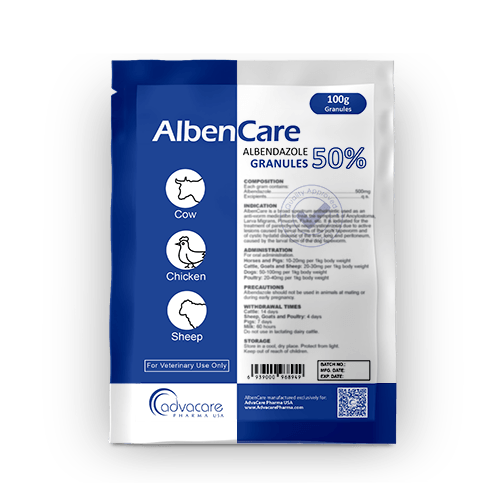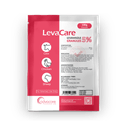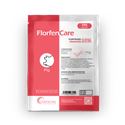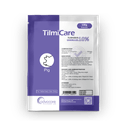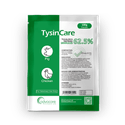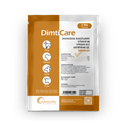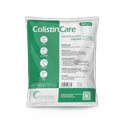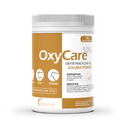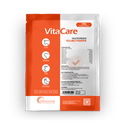- Home›
- Veterinary Pharmaceuticals›
- Veterinary Powders and Premixes›
- Veterinary Granules›
- Albendazole Granules
Albendazole Granules
Dosage
Packaging
What is Albendazole?
Active Ingredients: Albendazole
Albendazole Granules are an anthelmintic drug used to treat various parasite infections, including nematodes, cestodes, and protozoa. It is indicated for the treatment and prevention of gastrointestinal and pulmonary nematodiasis, taeniasis, and chronic liver fluke of livestock like calves, sheep, and goats.
Albendazole belongs to the drug class called benzimidazole anthelmintics. It exhibits broad-spectrum action against many varieties of worms, such as roundworms, tapeworms, and flukes of domestic animals and humans. The active ingredient works by inhibiting tubulin polymerization. As an effect, the worm's ability to utilize glucose is impaired, which results in immobilization and death.
This drug kills the worms, but eggs can survive a few weeks after treatment, so treatment may need to be repeated.
It is primarily utilized in the treatment of nematodes and trematodes in domestic animals. It has limited effectiveness against cestodes, which offer a wide safety margin and broad-spectrum activity against roundworms. This drug varies in absorption based on factors such as species, formulation, dosage, solubility, and the esophageal groove reflex.
Benzimidazoles, being water-soluble, undergo absorption in the gastrointestinal tract, with varying degrees of absorption for different animals. The journey of anthelmintic drugs within the body involves absorption into the bloodstream, distribution to various body parts, and eventual elimination through feces and urine after undergoing metabolic processes in the liver. Notably, horses and ruminants benefit significantly from Albendazole due to its slow passage through the cecum and rumen.
Among benzimidazoles, Albendazole stands out as one of the most effective, boasting the longest half-life. While the drug effectively eliminates worms, it's important to note that eggs may survive for a few weeks post-treatment, necessitating potential repeated interventions. It's crucial to highlight that Albendazole does not exhibit efficacy against external parasites.
It is important to note that Albendazole Granules is for veterinary purposes only. This formulation is intended to be prescribed by a veterinary doctor or animal care specialist for an animal.
This drug is available in the form of bolus, tablet, premix, and oral suspension. It is also available in combination with Oxyclozanide (bolus and oral suspension), as well as with Niclosamide and Rafoxanide (oral suspension).
Albendazole Granules are produced by AdvaCare Pharma, a pharmaceutical company specializing in global distribution. This veterinary medicine is manufactured in GMP-certified factories located in China, India, and the USA. We routinely inspect these facilities to ensure our products meet health, safety, and environmental standards.
Why are we a leading Albendazole manufacturer?
AdvaCare Pharma is an American-owned and operated company specializing in pharmaceuticals for veterinary use. We manufacture Albendazole Granules as part of our wide range of veterinary granules, which can be adapted to meet your specific market needs. To ensure the quality and efficacious of our veterinary products, we adhere to stringent GMP guidelines at our manufacturing facilities.
Uses
What is Albendazole used for?
It's used to treat various parasitic infections caused by nematodes, cestodes, and protozoa. It is indicated for the treatment of parasites such as:
- gastrointestinal worms (Bunostomum, Cooperia, Chabertia, Haemonchus, Nematodirus, Oesophagostomum, Ostertagia, Strongyloides, and Trichostrongylus)
- liver flukes (Fasciola hepatica, adults only)
- lungworm (Dictyocaulus viviparus and D. filaria.)
- tapeworms (Moniezia)
What animals can be treated with Albendazole Granules?
This medicine is recommended for dogs, horses, poultry, and livestock like cows, pigs, and sheep. Do not use Albendazole to treat birds like pigeons or doves.
How do Albendazole Granules work against gastrointestinal nematode infections in cattle?
The dosage for treating gastrointestinal nematode infections in cattle is determined by the body weight of the animals. Albendazole granules, when administered, can effectively inhibit nematode egg output, maintaining near-complete prevention for approximately four months. Notably, the concentration of pepsinogen may decrease during the course of treatment.
Cattle treated with Albendazole Granules exhibit reduced contamination of pastures with Trichostrongylid larvae, resulting in a cleaner environment post-treatment. Moreover, treated animals demonstrate an enhanced rate of weight gain compared to their untreated counterparts. On average, there is a notable body weight difference of 10.7kg between cattle that have received treatment with Albendazole granules and those that have not.
How do Albendazole Granules work against Haemonchus in lambs?
Lambs identified as positive for Haemonchus should undergo treatment with Albendazole granules. Extensive testing, including the in vivo fecal egg count reduction test and controlled anthelmintic efficacy test, has confirmed the effectiveness of this drug. Notably, when administered according to the manufacturer's recommendations, Albendazole demonstrates 100% efficacy against Haemonchus contortus.
How do Albendazole Granules work in dogs?
In small animals, this drug is not used for routine deworming. It is used for uncommon infections. Albendazole in dogs can help treat Paragonimus kellicotti infections, which are trematode (fluke) infections. It leads to cyst formation in the lungs and manifests with respiratory signs like coughing, dyspnea, bronchiectasis, hemoptysis, pneumothorax, and difficulty breathing. It can also be used for treating Capillaria plica, which infects the urinary bladder and causes bladder worms. It is used for treating Filaroides and Giardia infections.
How do Albendazole Granules help horses?
This drug is effective against large and small strongyles in horses like Oxyuris equi and Parascaris equorum. It is also effective against Dictyocaulus arnfieldi and S. vulgaris.
Does food affect Albendazole absorption?
In pigs, incorporating soybean oil into the pelleted food results in improved and prolonged absorption, leading to elevated systemic exposure for up to 48 hours following treatment. To optimize effectiveness, it is advisable to extend the contact time. Administering the total dose more frequently at 12-hour intervals and prolonging the exposure period, especially with more-soluble drugs, yields superior outcomes, even in cases involving benzimidazole-resistant worms. For enhanced efficacy, animals are recommended to have reduced feed intake, thereby slowing the flow rate of the drug.
How are Albendazole Granules used?
This medicine has been manufactured as granules and should be given orally.
How should Albendazole Granules be stored?
This medication should be stored in a dark, dry location under 30°C.
Is there a withdrawal period after treatment with Albendazole?
The withdrawal time is 8-14 days for meat and 3-5 days for milk. The exact duration will depend on local regulations.
Dosage
How much Albendazole Granules should be given to cows?
The usual dose is between 7.5-10mg of Albendazole per kg.
Refer to a veterinary doctor or pharmacist for guidelines on dosage.
Side Effects
There are few side effects in cattle and sheep when Albendazole Granules are administered at prescribed recommended doses.
Some serious side effects that have been reported include:
- allergy or hypersensitivity reactions
- severe diarrhea
- neutropenia
- aplastic anemia in dogs or cats
- seizures
- signs of a neurological problem (such as head pressing)
- liver toxicity or bone marrow damage in small animals.
When given at the recommended dosage, there have been few reported side effects caused by the use of Albendazole Granules. Some side effects may include but are not limited to appetite change and lethargy. The most common side effects include gastrointestinal changes.
In mice, sheep, and rabbits, Albendazole shows teratogenic effects. The most common malformations are visceral, craniofacial, and bone defects. Pregnant and lactating animals should not consume Albendazole.
Serious side effects may include allergy or hypersensitivity reactions. Other side effects include nausea, vomiting, or dizziness. However, reports of these side effects are minimal.
For a comprehensive list of all possible side effects of this medication, consult a veterinarian.
Precautions
Do NOT use Albendazole Granules for an animal that:
- has a known allergy or hypersensitivity to any of the ingredients.
- is in the first trimester of pregnancy.
- has a disorder or disease that affects the blood.
Treatment with this drug should be administered with caution for an animal that:
- has liver disease.
- is pregnant or lactating.
- is an alpaca, dove, or pigeon.
There are known interactions between Albendazole and other drugs, including cimetidine, dexamethasone, and praziquantel.
Always wash your hands thoroughly after handling this product. Pregnant women should not handle Albendazole products, as it can be absorbed through direct skin contact.
In birds, Albendazole may reduce laying performance and egg hatching.
Regular administration of anthelmintics for parasitic infections in ruminants and other animals carries the risk of inducing drug resistance. Prolonged use of the same anthelmintic may result in adverse side effects, and it is advisable to seek guidance from a veterinarian before considering a switch to a different anthelmintic drug. Suboptimal dosing of anthelmintics is known to contribute to the development of drug resistance. Additionally, the practice of prophylactic mass treatment can lead to resistance, rendering the drug ineffective. Typically, this drug is administered when animals are affected by a specific disease.
In cases of accidental overdosing, prompt management is essential. Adhering to the veterinarian's recommended dosage is crucial, and if a dose is missed, avoid administering two doses simultaneously. Overdosing can have adverse effects on the nervous, cardiovascular, and gastrointestinal systems.
Maintaining proper hygiene practices during the administration of this supplement is imperative to prevent the spread of parasites within the animal's environment. Even after successful treatment, animals can be reinfected if their surroundings are contaminated with parasites due to poor environmental hygiene. It is recommended to keep animals on a dry lot for 12 to 24 hours after you give the drug to prevent the deposition of eggs and larvae in the pasture, reducing the risk of reinfection.

You might be interested in...
Why AdvaCare Pharma?
As an industry leader, we are aware of our responsibility to provide affordable and sustainable solutions to improve healthcare worldwide.
